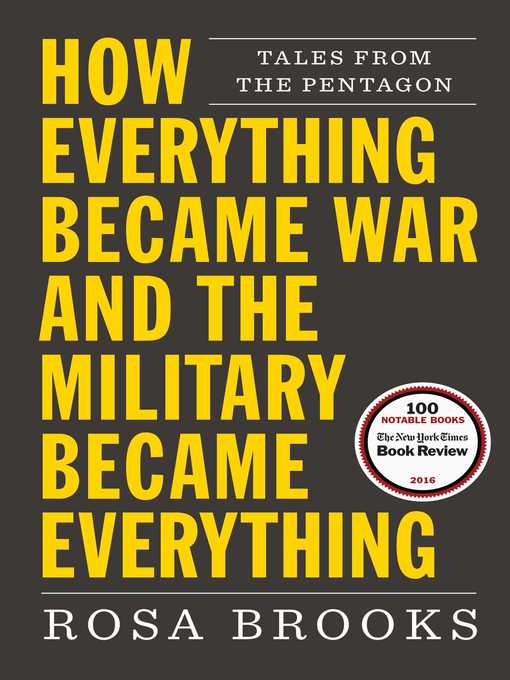
How Everything Became War and the Military Became Everything
Tales from the Pentagon
کتاب های مرتبط
- اطلاعات
- نقد و بررسی
- دیدگاه کاربران
نقد و بررسی

October 31, 2016
Brooks, a Georgetown University law professor and Foreign Policy columnist, reflects on her years of service as a senior advisor to an undersecretary of defense in this personal, if haphazard, account that is "part journalism, part policy, part history, part anthropology, part law, leavened with occasional stories." Brooks digests the meaning of war, the potential nature of future threats, and the realities of soldiering while she reports on sitting in on councils of war that track down terrorists via drones and other surreal features of America's vast national security framework. She includes snippets of historical warfare, from ancient societies up through America's disastrous forays into Iraq and Afghanistan. As Brooks jets around the world to such distant places as Uganda and Afghanistan, she often comes across as naive, and each episode ends up feeling like "a strange sort of tourism," as she describes a visit to the Guantánamo Bay detention center. She refreshingly concludes that Americans must insist on new frameworks to replace the thinking that has put the U.S. on an Orwellian path toward permanent war. Brooks crams too much into her unfocused work, but she does provide a thought-provoking glimpse inside America's vast post-9/11 national security apparatus. Agent: Kristine Dahl, ICM.

Starred review from June 1, 2016
A former senior Defense Department adviser explores the military's expanded role in a time when the lines between war and peace are dangerously blurred.When it comes to tennis, you can play by the rules, cheat, or remove the net and be playing a game that's recognizably tennis. In a post-9/11 world of persistent warfare, attention to definitions and rules matters more than ever, Brooks (Law/Georgetown Univ.; Can Might Make Rights?: Building the Rule of Law after Military Interventions, 2006) insists, to avoid awakening to find "that war has swallowed us whole." She expertly guides readers through this confusing new terrain, asking some basic questions. What constitutes an armed attack? What makes a soldier? What rules govern a drone strike or a special ops raid? What laws apply to National Security Agency wiretapping, indefinite lock-up, or to the violation of another nation's sovereignty? Throughout her consistently engaging discussion, the author mixes history, politics, and law and draws on her wide-ranging personal experience, inside and outside government, to answer these queries and more. Increasingly, she notes, we call on our esteemed and well-funded military to navigate the eroding boundaries between war and peace, assigning our combat forces tasks--providing humanitarian assistance, disaster relief, medical and engineering support--that go well beyond their historic role. Now, because modern war is not easily contained, new models of law and of institutions will be required. Brooks offers a few suggested reforms, some more easily accomplished (recalibrating military recruitment) than others (universal service), but whether she's invoking Wittgenstein's duck-rabbit image to illustrate the ambiguity of language and the importance of context, dissecting an excruciatingly difficult Hague Tribunal case assigning guilt to an obscure Croatian soldier, or drawing comparisons between a Putin-ordered assassination and an Obama-ordered drone strike, she never fails to stimulate and enlighten. Legal theorists and policymakers will approve the scholarship and close analysis; general readers will appreciate the sensitive storytelling, the wit, and the uncommon good sense.
COPYRIGHT(2016) Kirkus Reviews, ALL RIGHTS RESERVED.

























دیدگاه کاربران